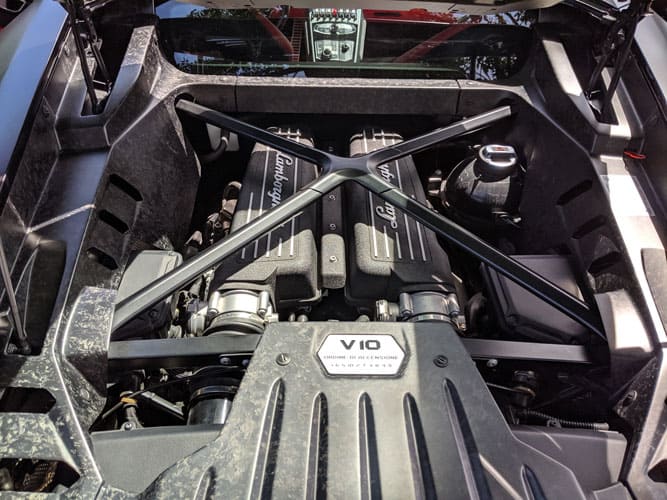Table of Contents
What Causes Car Vibrations or Shakes When Stopped?
Having your car vibrate or shake while you are stopped at a stoplight can be infuriating. But the good news is that you can likely do something about it to get the issue corrected. So what usually causes vibrations in a car when you are stopped?
If you are feeling vibrations or shaking from your car while stopped you likely have something causing your engine to run poorly or have worn engine mounts which is causing vibrations or shaking to be felt in the cabin of your car.
But how do you determine if you have a problem with your engine or if you have worn engine mounts? Keep reading to learn more.
Worn Engine Mounts Causing Vibrations
In order to prevent vibrations and shaking to be felt from your car’s engine in the cabin of your car engineers mount the engine on solid rubber engine mounts that will eliminate the vibrations from being transmitted to the inside of your car.
Over time these engine mounts can wear down and not be able to effectively shield you from the vibrations of your engine. When this happens your engine mounts will need to be replaced with new ones.
Your transmission mounts may also need to be replaced if your car’s engine mounts are going bad. Transmission mounts are what your car’s transmission will be mounted to and can also go bad over time.
How Do You Tell If Your Engine Mounts Are Worn Out?
Like I mentioned previously your engine mounts are designed to keep your engine from moving around. But engine mounts don’t keep your car bolted down to them, they are designed to allow a bit of play to allow your engine to move up and down.
Since engine and transmission mounts are comprised of rubber they will begin to crack and break down which can allow additional engine movement that should not occur.
The easiest way to check your engine mounts is by having someone watch your engine while you switch in between park, drive, and reverse.
Your engine should move around slightly when transitioning between drive and reverse gears. If your engine wants to lurch forward or backward when putting your car in drive or reverse it’s likely that your engine mounts are worn out.
To see what sort of movement you should be looking for check out the video below.
Engine Is Running Rough Causing Vibrations
Typically if your engine and transmission mounts are fine and you are still feeling vibrations or shakes in your car while stopped there is an issue with how your engine is running. Combustion engines as you probably know suck in air, compress the air and fuel together, then ignite that mixture with a spark from spark plugs to create combustion in the combustion chamber of each cylinder.
If there is a problem not allowing the engine to suck in air, the fuel to be injected into the engine cylinder, or a problem with your spark plugs not allowing them to spark properly then that’s going to cause the engine to run rough.
A rough idling engine will then cause additional vibrations to be felt throughout the vehicle. With engines, there are various systems that can go wrong that will cause the engine to run rough. I’ve compiled a list of the most common engine problems that can cause your engine to run rough or have a poor engine idle.
What Could Be Causing Your Engine to Run Rough
1. Old or Worn Out Spark Plugs
Your engine’s spark plugs can also have an impact on how well your engine is running and
I’ve talked about how when your engine is running rough vibrations from the engine can be transmitted into the chassis of the car and into the cabin of your car. One thing that can cause your engine to run rough is fouled or worn-out spark plugs.
If your spark plugs are worn out they won’t allow your engine to run as well because they won’t be able to burn off all of the fuel injected into the piston cylinder. This would cause your engine to run poorly, which in turn would cause more vibrations from the engine, which would be transmitted into the cabin.
2. Problems With Fuel System
Your car’s engine uses compressed air along with fuel to create a spark to keep your engine turning. If there is a problem with a component of the fuel system of your car this can cause your engine to run rough and cause vibrations or shaking that can be felt inside of the car.
Fuel lines can become gummed up over time if low-quality gas has been used to fill up your car’s gas tank. Fuel injectors can also become plugged over time which can also cause your engine to run rough.
3. Problems With Vacuum Hose
The engine in your car is essentially a big air pump that sucks in air, compresses it, and then sends it back out the exhaust. There are also rubber hoses attached to your engine that are designed to use the vacuum effect of your engine to power other accessories like your brake booster.
Over time these rubber hoses can become brittle and crack which disrupts the vacuum effect and can cause your engine to run rough. When your engine is running roughly the extra vibration from the engine can be felt on the inside of your car.
4. Problems With Engine Idle
One reason why your car can shake or vibrate while stopped is problems with your engine idle. Over time your engine idle speed may change which can cause your engine to shake more than it would if the idle was consistent.
If you see your tachometer bouncing up and down when you don’t have your foot on the gas pedal this is a sign that there is something wrong with your engine idle speed. Your engine should maintain a consistent idle speed when you are stopped and the engine is running.
If your engine is running poorly it can cause the engine to shake or vibrate more than it would if it was operating properly. You may need an engine tune-up performed if you don’t know how to diagnosis engine idle problems yourself.
5. Worn or Damaged Timing Belt/Chain
Another reason why your car’s engine could be running rough is that the timing belt or timing chain is worn out. The purpose of a timing belt or timing chain is to ensure that the moving parts of the engine work in harmony with each other and that they don’t accidentally collide causing engine damage.
Since timing belts are made from rubber over time they can become brittle and crack or get stretched out. Timing chains are made from steel links but they are also susceptible to stretching over hundreds of thousands of miles.
When your timing belt or chain gets stretched it can cause the moving parts of your engine to get out of sync with each other which can cause your engine to run rough and cause vibrations from the engine to be transmitted throughout the car.
The easiest way to fix this sort of issue is to have your timing belt or timing chain replaced with a new one so that the moving parts of your engine stay in sync with each other.
Why Are Engine and Transmission Mounts Important?
Engine mounts are important because they hold the engine and transmission to the car. Because engine and transmission mounts are made of rubber they will break down over time and will need to be replaced.
Neglecting to change your engine and transmission mounts can cause more issues under the hood of your vehicle. If your engine and transmission mounts are worn out they can allow additional vibration in the engine bay causing additional wear of the internals of your engine.
Engine and transmission mounts also prevent vibrations from going into the steering wheel of your car or being directly sent to the chassis of your car.
Related Questions
Is it Normal for a Car to Vibrate When Stopped? While it’s normal to have your car vibrate a little bit while stopped you should not feel like your seat is giving you a massage. If you can hear things inside your car shaking and rattling you likely have a problem with your engine running rough or your engine mounts are worn.
Can Too Much Oil Cause Engine Vibration? What happens if you put too much oil in your car, can that cause engine vibrations? Adding too much oil to your car can have a negative impact on the internals of the engine but you’d have to add more than just an extra quart of oil to cause the engine to run rough.
If you filled up your engine with oil to the top of the dipstick then yes, the engine will run rough and try to stall. But if you just added an extra quart of oil it’s likely that the oil is not to blame for the engine vibrations.
Can Low Oil Cause An Engine to Shake? Low engine oil can also be an issue for your engine but in reality, if your engine is low on oil you shouldn’t feel any extra vibrations inside of your car. Running low on engine oil is still not good for your engine so you should add extra oil to your engine as soon as you notice that the engine oil level is low.

